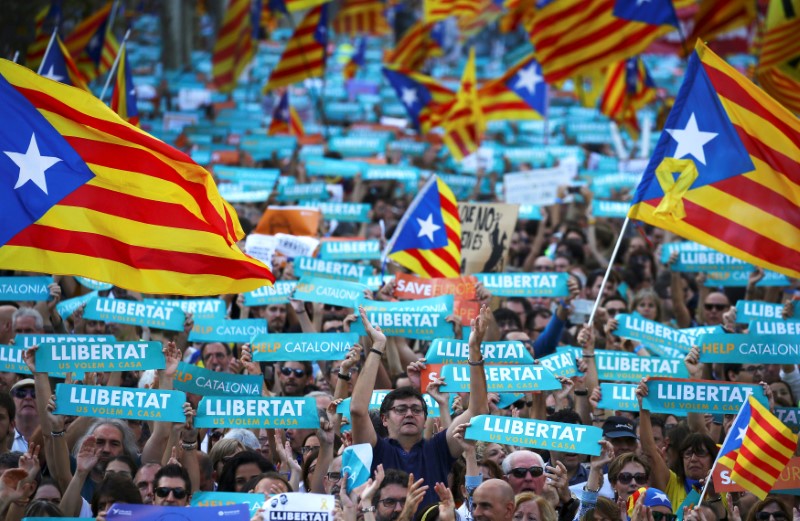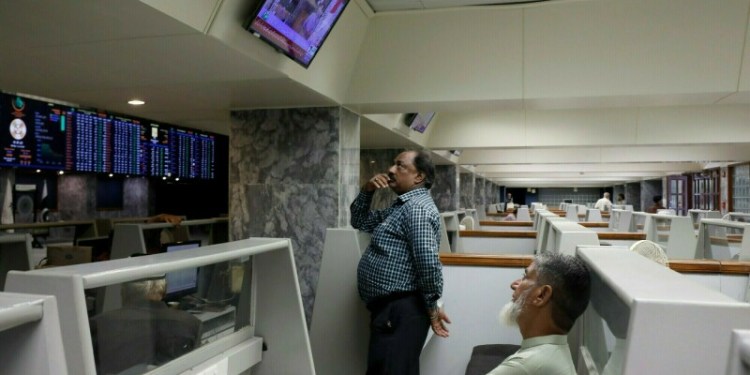 © Reuters. People wave separatisy Catalan flags and placards during a demonstration organised by Catalan pro-independence movements ANC (Catalan National Assembly) and Omnium Cutural, following the imprisonment of their two leaders in Barcelona
© Reuters. People wave separatisy Catalan flags and placards during a demonstration organised by Catalan pro-independence movements ANC (Catalan National Assembly) and Omnium Cutural, following the imprisonment of their two leaders in BarcelonaBy Sam Edwards
BARCELONA (Reuters) – The Spanish government has urged Catalonians to accept direct control from Madrid and ignore instructions from the restive region’s secessionist leadership once it has been removed from power.
Sunday’s message came a day after Madrid resolved to take the unprecedented constitutional step of firing the Catalonia government, a last resort to thwart its independence campaign and calm fears of unrest and economic turmoil in the heart of the euro zone.
The decision, to be implemented this week, brought tens of thousands of pro-independence protesters onto the streets of Barcelona on Saturday and was rejected by Catalan President Carles Puigdemont.
The regional parliament’s speaker, Carme Forcadell, said she would not accept Madrid’s move and accused Spanish Prime Minister Mariano Rajoy of staging a “coup”.
Spanish Foreign Minister Alfonso Dastis responded on Sunday with the call to obey Madrid.
“All the government is trying to do, and reluctantly, is to reinstate the legal order, to restore the constitution but also the Catalan rules and proceed from there,” Dastis told BBC TV.
“We are going to establish the authorities who are going to rule the day-to-day affairs of Catalonia according to the Catalan laws and norms … I hope everyone will disregard whatever instructions they will be planning to give because they will not have the legal authority to do that.”
Catalonia’s leaders say they will not accept direct rule imposed by Madrid, raising the prospect that they and their supporters will seek to defy the Spanish government when the time comes to remove them from office.
Rajoy’s plan still needs Senate approval in a session set for Friday. Once it gains the expected approval Madrid can take full control of Catalonia’s finances, police and public media and curb the powers of the regional parliament for up to six months, until fresh regional elections.
Street protests for and against independence in Catalonia have involved hundreds of thousands of people. Though a violent crackdown by national police during Catalonia’s Oct. 1 independence referendum left hundreds injured, the protests have remained peaceful so far.
But Rajoy’s unprecedented plan to use special constitutional powers has angered both sides and raised concern over the potential for unrest if Catalan leaders resist and call for civil disobedience.
ECONOMIC FEARS
They have not done that, but investors are worried about the possible fallout from such moves by a region that makes up a fifth of Spain’s economy. Hundreds of companies have shifted their headquarters outside the region and Madrid has made downward revisions to its economic forecasts.
Mikel Lekue, a 24-year-old Spaniard studying in Barcelona, said he did not support Catalan independence but criticized Rajoy’s tactics in invoking article 155 of the national constitution for the first time to take control of a region.
“I don’t agree with article 155. For all the errors the Catalan government has made, and they have made many, I don’t think the solution is to remove Catalan autonomy,” he said as he walked in central Barcelona with a friend.
“I think they need to sit down and talk.”
Catalan President Puigdemont, who made a symbolic declaration of independence on Oct. 10 after the referendum, called Rajoy’s move the “worst attacks against the people of Catalonia” since Spain’s military dictatorship.
Puigdemont has stopped short of saying he would make good his threat to push ahead with a parliamentary vote on independence before direct rule takes effect.
“I ask the (Catalan) parliament to meet in a plenary session, during which we, the representatives of the citizens’ sovereignty, will be able to decide over this attempt to liquidate our government and our democracy, and act in consequence,” Puigdemont said in a televised address.
Rajoy, who acted with backing from King Felipe and the main opposition party in Madrid, said the crisis was jeopardizing recovery in the euro zone’s fourth-largest economy.
“Our objective is to restore the law and a normal cohabitation among citizens, which has deteriorated a lot; continue with the economic recovery, which is under threat today in Catalonia, and celebrate elections in a situation of normality,” he said.
The regional assembly is expected to decide on Monday whether to hold a session to formally proclaim the republic of Catalonia.
Catalan media have said Puigdemont could dissolve the regional parliament and call elections by next Friday. Under Catalan law, those elections would take place within two months.
That would enable Puigdemont to go the polls earlier than envisaged by Rajoy, who spoke of a six-month timetable, and to exploit the anti-Madrid sentiment running high in the region.
Source: Investing.com




























